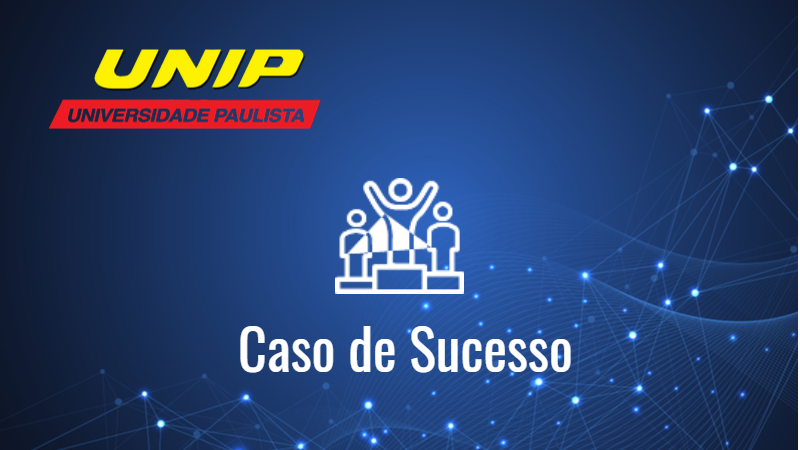UNIP – Large economies of scale in the mass production of videoclasses, with perfect use experience for students in more than a thousand Distance Education poles in Brazil and even Japan
Videoclasses were always considered an important education tool for the UNIP Objetivo Group, which today has distance education as one of the central pillars of its business, with more than a thousand distance education poles throughout Brazil and even in Japan. Producing from six to eight thousand videoclasses per year, UNIP Objetivo enjoys a fruitful partnership with Microsoft and ITCore for the distribution, production and automatic subtitling of these videos, utilizing artificial intelligence resources and machine-learning mechanisms for the automatic translation of the subtitles into five languages. A series of Microsoft solutions, such as Azure Cognitive Services, Azure Media Services and Microsoft Video Indexer were combined to provide a perfect video experience for the student. And the institution gained economies of scale, significantly saving time and money.
The Institution
Grupo UNIP Objetivo is the third largest educational group in Brazil, operating from childhood to Phd education. It has around 750,000 students in different units: 28 UNIP campuses, 10 UNIP schools, 48 associated faculties, 1,200 distance education poles and an additional pole in Japan.
The Challenge
To popularize video as an educational object, serving more than a thousand distance education poles, including in Japan
The video educational object was always on the agenda as an important educational tool, historically used frequently by UNIP. The volume of videos produced – totaling approximately 60,000 video-classes – used to be hosted in its own environment, which besides requiring huge storage capacity involved inherent problems for the data center, such as the instability of internet links and power outages, in addition to requiring a team working 24×7 to monitor and ensure the availability of all this content material, essential for distance education.
And these video-classes needed to be delivered to different platforms, such as tablets, smartphones and computers of every type and, also, by means of the most varied browsers. The director of technology of Grupo UNIP Objetivo, Marcello Vannini, remembers that this whole process was obviously extremely arduous for the institution’s team, which above all was constantly faced with having to choose which type of student would be jeopardized on receiving the video. He explains:
“Thinking of Brazil, with different connection realities, I had to make a difficult choice: to penalize the students in the big urban centers, with access to more satisfactory internet bands, delivering them with a video of lower quality, but compatible with the type of access existing in the more remote regions; or penalize the student in the more distant centers creating high quality videos.”
Vannini also points to the question of accessibility:
“We record six to eight thousand new classes per year. How do you put this on a production scale, generating subtitles to meet the needs of students with hearing impairment? And in multiple languages, for the students that join the group on exchange programs, in our widely different business units?”
The solution
Cloud + Artificial Intelligence + Machine Learning = subtitling automation with translation into five languages, and deliveries at rates compatible with the device of each student
“What did we do? Our first step was to get all of this and throw it on the cloud, to Azure. The platform itself adjusts the delivery of the video at the best rate and format corresponding to the device of whoever was consuming this content,” says Vannini.
The cloud represented a big step also in terms of availability, maintaining the material in cache in points of presence (PoPs) distributed geographically so as to provide greater speed of access and consequently eliminating problems of delays arising from the distance between the issuing and reception of the content.
ITCore developed an app that automated the encoding and transcripting process of the videoclasses. The video is loaded through the App, and the production occurs without human intervention, providing agility and reducing operational problems.
The next step, with the development support of ITCore, was to automate the transcription of speech to sub-titles with the resources of speech-to-text of Azure’s artificial intelligence which, combined with machine learning, refine increasingly the accuracy of the transcription process of speech-to-text.
The use of an Azure Cognitive Services’ API also allowed the automatic translation into five languages: English, Spanish, French, German and Japanese, and, soon also into Mandarin. And with machine-learning resources incorporated with the work of IT Core, the translations are improving more and more.
The benefits
Economies of scale, with the saving of time and money
The whole process of collaboration with Microsoft has brought enormous benefits for the distribution and production of the video-classes of the UNIP Objetivo Group.
In particular, there was an enormous gain in time and resources with the automation of subtitles which, thanks to machine learning, became more accurate, reducing increasingly the revision efforts involved in the subtitling process
“The development of this platform was the work that ITCore did with us so that the platform learnt. Imagine the same teacher recording 10,15, 20, 100 classes during a year. If I had a platform that learns as that teacher speaks, what is the accent, what are the language vices that he has, my human work is reduced considerably in the revision of subtitles,” adds Vannini.
He celebrates the solution found which, in his words, “generated a large economy of scale and with significant financial savings. Now we have managed effectively to popularize the use of video, with subtitles and for multiple media.”

